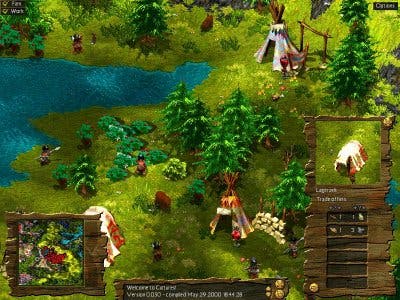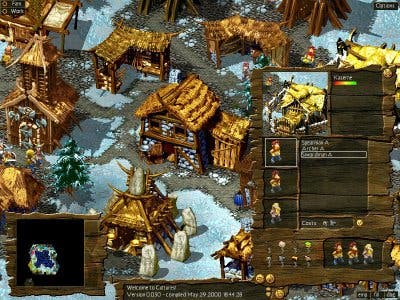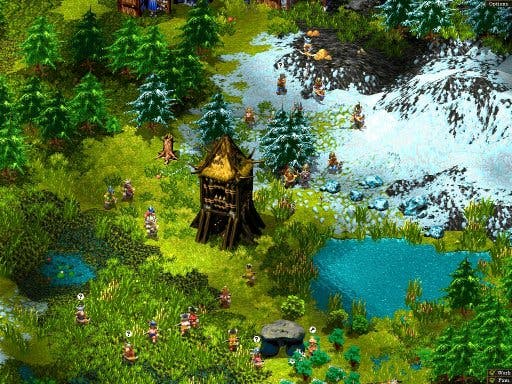Cultures
Review - a God sim where you control a group of Vikings, beer and all

Valhalla for everyone!
Vikings were nasty chaps. They used to land off our coast before venturing onto our land to rape our women, pillage our towns and kill our men. They were bastards, quite clearly. But then blow me if they haven't gone and inspired a damn fine God game! While Cultures shares not only its creator's CV but also its general aesthetic with classic strat-fest The Settlers 3 (and its esteemed lineage), it's a very quirky and entertaining game in its own right when you get down to the nitty gritty. Your objective in Cultures is to turn a group of nasty, loathsome and downright stupid Vikings into a successful, educated and prospering community with the ability to survive the onslaught of their pillaging ilk and live harmoniously with the locals. It's a tall order but it can be achieved. But what is it that makes a Viking want to settle down? Apparently it's a mixture of the religious and the coincidental. Our Viking troop was growing tired of pillaging, its homeland already destroyed, and when a comet explodes and rains down upon them they treat it as a sign from their Gods to move on, shifting their butts into longboats and rowing to the continent of North America, with the firm intention of overcoming and colonizing it. The game starts out with you helping them through a campaign of mapping and populating the West.

Absurd?
Yes, fundamentally, but arranged and executed in a very spontaneous and enjoyable manner, showing the gamer how ruthless and motivated the Vikings were, despite their long journey. I mentioned earlier how the similarities between The Settlers and Cultures dwindle as you continue with it. The biggest difference has to be the personal level upon which you interact with your Viking chums. Each Viking has its own name and various social and personal statistics associated with them; it's your job to improve them. In a way Cultures has more in common with what we've heard about Black & White in that it's less crucial to control your Vikings but important to influence them. The right decisions can affect not only your little Scandinavian chum's lifestyle, but also his happiness. If you marry him to a girl with all the visual charm of a skunk's rear end he is going to be unhappy. When playing Cultures I felt more as though I was aiding their development than winning anything, and yet it felt satisfying. It's a similar feeling to that which I experienced playing The Sims, only different, because here I was focusing on a multitude of detailed resources, like different types of clothing, and not just worrying about my net worth. Similarly, you can focus on the personal and social development of a single villager, or you could treat them as a sort of Communal Farm, working with them as a whole. Needless to say there's so much potential for replay it's not funny.

Ouch!
Of course, if you've busied yourself with developing your colony into the Viking version of the hippies, free love and all, you may find yourself in a spot of bother when the locals come looking for a bit of the action. Training up your most rowdy Vikings at a young age to fight to the death is a good idea, but once again you are training them for potential combat, not the inevitable, and in a way that's what makes Cultures so pleasant; you are living out the lives of a group of Vikings, and just like characters in a good book, you treat them like family and feel endeared to them. As such throwing them into battle is a last resort and wherever possible you attempt to make use of diplomacy to save their hides from Indians, Mayans and Eskimos. But it's not as open-ended as something like The Sims; there is a set mission structure to observe. After getting the basic gist of things you are given individual campaigns to master and eleven different scenarios. It may not be The Sims then, but in terms of accessibility it's easy enough to pick up every once in a while without feeling overwhelmed. Part of what makes the Vikings so endearing is how close you feel to them. You know exactly how they are living and what their living conditions are like, because you can check more or less every statistic imaginable, right down to the absurd details like how the indigenous foliage is getting on. They may have been dirty brutes in the past but you are educating them and living with them. And if you think one of your Vikings is taking a bit of a liberty with you, you can pull up a menu immediately to track his whereabouts under that bush with Lola the Luscious. There's a time and a place, after all.

Ease of use
Part of Cultures attraction for me was how easy it was to get into and re-enter into whenever I liked. Due to the broad spectrum of campaigns and scenarios it's easy enough to have a stab whenever you feel inclined, and thanks to the low system requirements (despite the thoroughly appropriate visuals) you needn't spend half a minute sharpening your helmet in between loads. Multiplayer is another aspect that will add to the game's appeal. Although the computer AI is captivating enough, the multiplayer is done in a very cunning fashion to allow up to six players to take part across a LAN or on the Net, with each taking on the role of a group of Vikings. Seeing as the game has yet to be released we were unable to verify the Internet portion of the title, but our LAN games were enthralling.. It's at about this point in the review that you must be starting to wonder just what we have to say against Cultures. Well, very little really. There's no claret to accompany your battles and of course it's startlingly unoriginal as far as fans of The Settlers go, but aside from that the only thing we could find that might put people off was the slow pace. But lets face it, if you're after a real-time strategy game you'll pick up Red Alert 2.
Conclusion
In retrospect it's very hard to pigeonhole Cultures as emanating from any one single source. It's a God-sim, that's for certain, but it's exhaustively detailed and easy to get into and enjoy. Far from being a clone of any one game, it's a delightful mixture of the genre's finest. If you don't think the slow pace of the game will perturb you, pick it up now.

